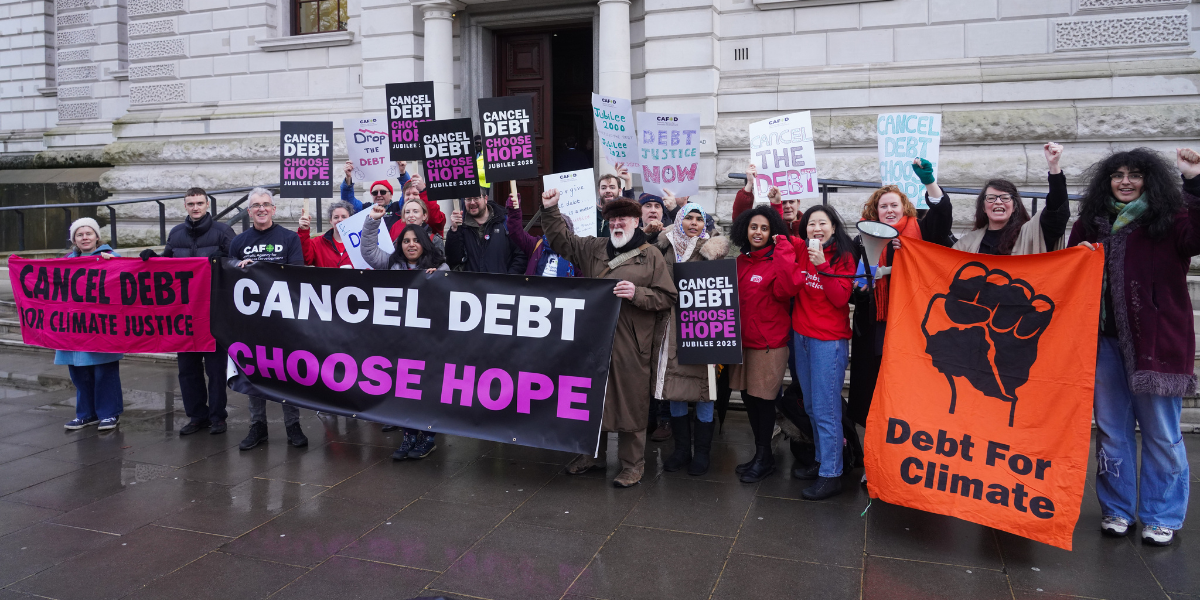As we enter the Jubilee Year 2025, CIDSE supports the global call for debt justice, recognising that unsustainable debt traps millions of people in poverty. In the Global South, debt repayments divert vital resources from health, education, and climate action. CIDSE stands for the urgent resolution of unsustainable debt based on justice, solidarity, and ecological responsibility, addressing both historical and contemporary inequalities. To tackle this issue, CIDSE urges for the following measures:
Debt Cancellation and Restructuring
A significant number of low- and middle-income countries are trapped into a harmful cycle of debt, thereby impeding their capacity to allocate resources towards crucial sectors such as healthcare, education, and social protection. CIDSE advocates for the cancellation of unpayable debts, thus enabling governments to accord the priorities of their people. The debt remedy should entail canceling or substantially reducing unjust and excessive debts. This should be accompanied by meticulous and independent sustainability audit analysis to identify illegitimate debts (those unfairly imposed without public interest, used to fuel conflicts or human rights abuses, grown so large that they undermine essential services and climate action, or rendered unsustainable by the debtor country’s economic conditions) that should be excluded from repayment obligations. The absence of such measures will inevitably perpetuate the financial burden, impeding economic and social progress and leaving millions vulnerable.
Holding Private Creditors Accountable
A considerable proportion of global debt is held by private creditors, including banking institutions and investment firms, which frequently slow down or decline to participate in debt relief initiatives. This scenario places economically vulnerable nations at the whim of financial institutions that prioritise profit maximisation over human well-being. CIDSE pushes for legislative action by governments, especially in the United Kingdom and the State of New York as other G7 members, to ensure that private creditors contribute to debt relief efforts. The absence of mandatory participation from these institutions could compromise the efficacy of debt relief efforts, perpetuating an inequitable system. Ensuring private sector participation is also essential to prevent public funds allocated for debt restructuring or cancellation from indirectly serving as reimbursing private companies that do not make comparable efforts. The ongoing profit-making activities of private creditors at the expense of debtor nations, who are compelled to reduce essential services, is an inequitable situation. In light of these concerns, CIDSE is calling upon international bodies such as the UN to establish legal frameworks that enforce private creditors to participate in debt relief initiatives or from imposing sanctions on countries that opt to suspend their payments.
Structural Financial Reforms
Beyond the immediate cancellation of debt, CIDSE advocates for long-term reforms in the global financial system to prevent future debt crises. The current financial structure is biased towards wealthy nations and creditors, leaving developing countries with limited autonomy in shaping their economic futures. To address this imbalance, CIDSE supports the establishment of a sovereign debt workout mechanism under the auspices of the United Nations. This mechanism would ensure that debt disputes are resolved equitably and that developing nations are not compelled to adopt detrimental economic policies dictated by creditors. Additionally, CIDSE appeals for greater transparency and fairness in global lending practices so that countries do not fall into unsustainable debt in the first place. Without systemic change, debt crises will continue to recur, trapping nations in cycles of economic dependence and instability.
Justice for the Most Affected
At the heart of CIDSE’s position is the belief that debt justice is a matter of human dignity and global solidarity. The burden of debt falls most heavily on the poor, and wealthier nations and financial institutions must bear responsibility for the systemic inequalities that exacerbate these conditions. CIDSE urges upon policymakers to act with urgency and moral responsibility, ensuring that debt policies prioritize human well-being over profit.
CIDSE contact person:
Giorgio Gotra, Operations and Communications’ Manager (gotra(at)cidse.org)
Additional Resources:
– ELSIA Press Release: “Rethinking debt: a moral call for a just future”, March 2025
– CIDSE article: “2025: A Year to Turn Hope into Action”, February 2025
– CIDSE Policy Briefing ” Financing a Just, Global COVID-19 Response and Recovery, the role of debt cancellation, restructuring and new finance”, February 2021
– CIDSE statement ” CIDSE calls for debt cancellation and financial support to poorest countries ahead of G20 Finance Ministers Meeting“, February 2021
Cover photo: Debt Justice coalition stunt in front of the HM Treasury, UK, 2025. Credit: Kristian Buus

